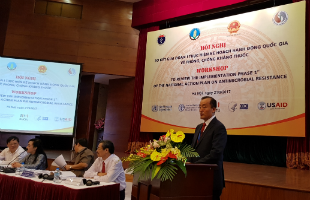
I am very glad to deliver a joint message of FAO and WHO on behalf of our two organizations.
I am also very pleased to confirm the strong and high-level commitment of the Government of Viet Nam on this issue, antimicrobial resistance, AMR.
AMR happens when micro-organisms change when they are exposed to antimicrobial drugs. AMR is present in every country. AMR is found in people, animals, food, and the environment. They can spread between people and animals, and from person to person.
AMR is threatening our ability to treat common infectious diseases, resulting in prolonged illness, disability and death. AMR increases the cost of health care.
Ladies & Gentlemen,
What I would say to you today is this: The current burden of AMR is just the tip of the iceberg for the future burden of AMR. If we don't want to see the full-blown burden of AMR, we must take action now.
The estimated death toll due to AMR is around 700,000 deaths per year globally. If we fail to control AMR, it will increase up to 10 million per year in 2050, which is more than the estimates for cancer and ten times more that for diabetes.
On the other hand, the economic cost of AMR in 2050 would go up to 100 trillion USD.
Today, one year ago, for the first time, Heads of State committed to taking a broad, coordinated approach to address the root causes of AMR across multiple sectors, especially human health, animal health and agriculture.
Countries reaffirmed their commitment to develop national action plans on AMR, based on the Global Action Plan on Antimicrobial Resistance—the blueprint for tackling AMR developed in 2015 by the World Health Organization (WHO) in coordination with the Food and Agriculture Organization of the United Nations (FAO) and the World Organisation for Animal Health (OIE).
They pledged to strengthen the regulations on antimicrobials, improve knowledge and awareness, and promote best practices — as well as to foster innovative approaches using alternatives to antimicrobials and new technologies for diagnostics and vaccines.
Ladies & Gentlemen,
The second message I would like to convey to you today is that I am proud to serve this country on this matter, AMR. Viet Nam acted ahead of UN Political Declaration on AMR.
In 2013, Viet Nam passed the National Action Plan on AMR, the first country in WHO’s Western Pacific Region to do so.
In 2015, the government forged wider action across the ministries of health, agriculture, environment, trade and industry, and those Ministries signed the Aide Memoire for Inter-sectoral Action against AMR.
To ensure oversight of the actions under the Aide Memoire, the government has set-up the National Steering Committee against AMR represented at high- level from the four sectors. Last month the Ministry of Agriculture and Rural Development, with support of FAO, adopted a national action plan to tackle the over-consumption of antimicrobials in livestock and fishery.
Today, we will review the implementation of the National Action Plan. WHO and FAO are pleased to see the extensive progress Viet Nam has made in implementing these NAPs.
Ladies & Gentleman,
In November of this year, Viet Nam will mark the third annual World Antibiotics Awareness Week. The theme of this year’s campaign in Viet Nam is: Reduce antibiotics use, Combat Antimicrobial Resistance.
This campaign highlights our continued effort to get everyone involved and we hope that also this year the health, agriculture, trade and industry and environment and natural resources sectors join hands.
By committing to work together in the country, Viet Nam is making a great contribution to the global fight against AMR.
Thank you once again for your support and collaboration. The UN in Viet Nam, through WHO and FAO stands committed to support Viet Nam to secure the health and lives of our people.
Thank you.
